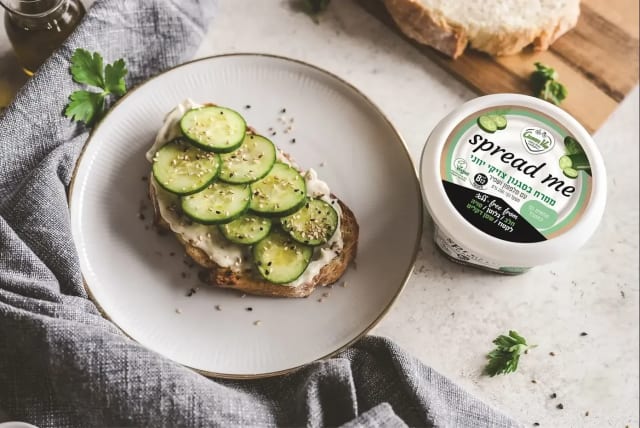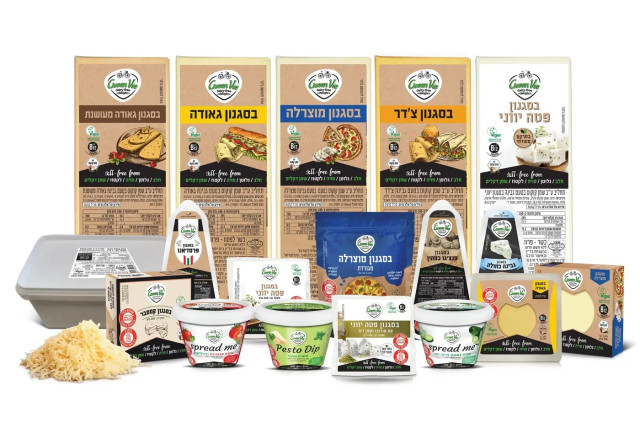Flexitarianism: Over 50% of Israelis are reducing animal food consumption

Survey reveals over 50% of Israelis reducing animal food consumption, with 31% vegetarians and 16% vegans. Satisfaction with vegan cheeses also examined.
About 31% of the respondents identify themselves as vegetarians, 16% define themselves as vegans, and in every third household in Israel one of the family members is a vegetarian. This is according to a new survey conducted by the Rushink Research Institute, for the food importer NEOBRAND, which examined the preferences of the vegan diet in general and the satisfaction with vegan cheeses in particular, among Israelis. The survey was conducted on the occasion of the launch of the Green Vie vegan cheese brand in Israel. The findings of the survey reveal that among Israelis there is an expanding segment of food consumers of the "reductionist" type, that is, consumers who try to reduce and reduce the consumption of animal food in their daily diet.
The Flexitarianisms are neither vegetarians nor vegans, but they try to consume less animal foods. Among the entire sample, about 16% of the respondents to the survey reported that they are Flexitarianisms who try to consume less animal food. 23% eat animal food once or twice a week (regardless of vegetarianism). Among those who reduce only: (16% of the total sample) 53% try to reduce the consumption of animal foods, 31% are vegetarians, 11% tend to a vegan diet and 5% are vegans.
In every third house - lives a Flexitarian
The findings of the survey show that every third nuclear family in Israel has at least one family member who meets the definition of 'Flexitarianism'. In families where there is at least one Flexitarian, it is more likely that the other family members will also reduce. To the question 'Are you considering reducing your meat/chicken/fish/dairy products in the coming year?' 23% of those whose family has a dieter answered that they would indeed reduce, while among all those who eat animal foods, 14% answered that they would reduce eating animal foods in the coming year.
When they were asked "When did you start to reduce eating meat/poultry/fish/dairy products"? 11% of the Flexitarians answered that they started reducing only in the last year. 23% started the process about two or three years ago. Among the vegans, the situation is different: 9% of them entered the process in the last year, 15% two or three years ago.
Not interested in eating animals
What is the main reason why people reduce eating animal products? The survey found two main reasons for reducing the eating of animal products, among vegans and dieters: most of them are not interested in eating animals and what they produce (65% of vegans and 57% of dieters). Another reason is related to the healthy lifestyle attributed to dieters (15% of vegans and 24% of dieters).
Who are the consumers who eat vegan cheeses? The survey data show relatively high rates of eating vegan cheeses among women, residents of the center and academics.
How often, if ever, do you eat vegan cheeses? About half of the vegans answered that they usually eat vegan cheeses every week.
They prefer the vegan cheese in a sandwich
Among those who regularly consume vegan cheeses, 79% prefer to consume them in sandwiches, 59% eat the cheese itself with a cracker or biscuit, 49% eat vegan cheeses in cooked foods and 49% eat vegan cheeses as an addition to a dish. (Respondents could name more than one option).
Satisfied with the existing supply of vegan cheeses? About half of the vegans and dieters are not satisfied with the supply of vegan cheeses that existed until today in Israel.
The question regarding the prices and variety was answered by those who consume vegan cheeses 0, both vegans and dieters, and their answers are ranked similarly: 93% of vegans and 68% of dieters claim that the prices of vegan cheeses are too expensive, 67% of vegans and 58% of dieters think that the problem lies in the taste of The cheeses, 46% of the vegans and 34% of the dieters are not satisfied with the limited variety available in the market.
The survey was conducted online, among 500 respondents who are a nationally representative random sample of Jews between the ages of 18 and 70 who are connected to the Internet. The collection of the findings was carried out on February 15-16, 2024. "In the survey, we asked to check the dietary preferences of vegan and reduced-fat consumers in Israel and their satisfaction with vegan cheeses. We discovered that the trend of "Flexitarianisms" is expanding, with at least one "Flexitarianism" living in every third house in Israel and more than half Israelis try to reduce their consumption of animal foods," says Reot Vakanin, one of the owners of NeoBrand.
"We also discovered that the majority of Israeli dieters are not satisfied with the existing supply of vegan cheeses, as well as their prices and taste. With the launch of Green Vie's vegan cheeses, we are providing a comprehensive solution for dieters and vegan consumers in the varied quantity of products (over 20 different products), also in flavors and in their textures and also in the price range similar to the price of similar products in the category.
Neobrand imports food products to Israel that provide a response to diverse audiences that consume special nutrition, when we always put before our eyes the quality of the products, their tastes and textures, with the aim of providing the consumer with the closest experience to consuming the normal nutritional equivalent" .
Jerusalem Post Store
`; document.getElementById("linkPremium").innerHTML = cont; var divWithLink = document.getElementById("premium-link"); if (divWithLink !== null && divWithLink !== 'undefined') { divWithLink.style.border = "solid 1px #cb0f3e"; divWithLink.style.textAlign = "center"; divWithLink.style.marginBottom = "15px"; divWithLink.style.marginTop = "15px"; divWithLink.style.width = "100%"; divWithLink.style.backgroundColor = "#122952"; divWithLink.style.color = "#ffffff"; divWithLink.style.lineHeight = "1.5"; } } (function (v, i) { });


